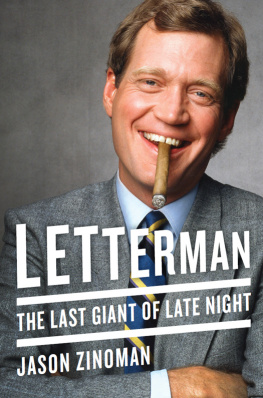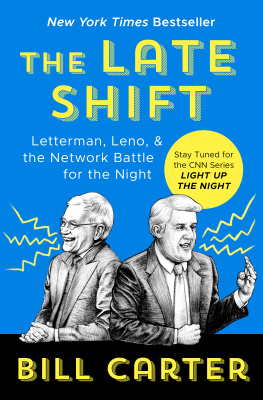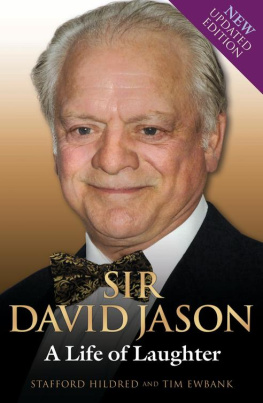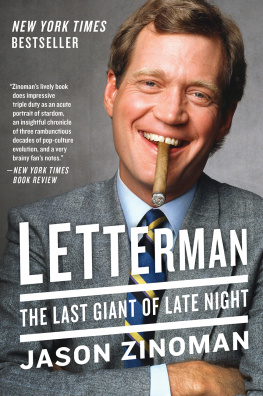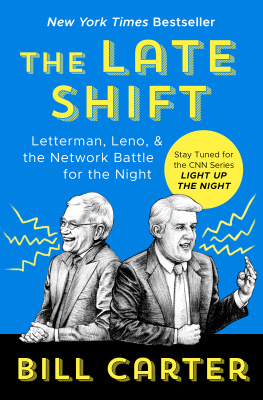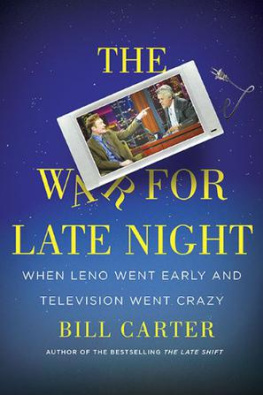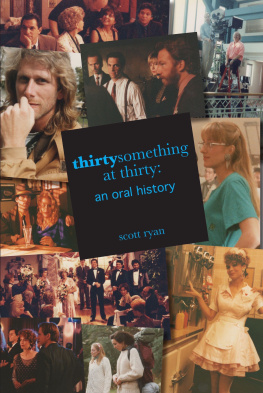I n the summer of 1968, David Lettermans girlfriend gave him an ultimatum: Get married or break up.
Michelle Cook had just graduated from Ball State University and thought that Letterman, then working his first television job as a weekend weatherman during the summer before his last year of school, wasnt committing to the relationship. After she confronted him, he panicked. I could not lose her, Letterman recalled. That horrified me.
But so did the prospect of telling his parents that he was getting married. He was living at home, and he knew they would not approve. They didnt like her, Letterman said, but they didnt really know her.
David Letterman saw himself as stuck in an impossible situation, trapped between the demands of his girlfriend and the wishes of his parents. He settled on a solution that required the least conflict, at least in the short term: He got married in secret.
One afternoon in July, Cooks roommate, Sue Berninger, drove the couple to a house fifteen minutes from campus. Letterman had been drinking beer after beer and was buzzed by the time he was met at the door by a sober-faced justice of the peace.
I was hitchhiking, and the next thing you know, they pick me up and were getting married, Letterman said to the justice, introducing himself with a joke while nodding toward Cook and Berninger.
In response, the stoic man did not smile. In the course of filling out the paperwork, he asked the pair if theyd been married before. Six times, and every one a gypsy, Letterman cracked, before answering seriously. Berninger stifled a laugh while Cook flashed Letterman a warm look of recognition.
When the time came for the traditional question of whether there was any reason they should not get married, Letterman turned his head to Berninger and joked: This is your last chance.
Even at his own commitment ceremony, David Letterman didnt entirely commit.
David Letterman entered the national consciousness in the early 1980s, when the roiling revolutions of the Not Ready for Prime Time Players of the original Saturday Night Live were in transition, and the most popular comedian in America, Steve Martin, had just retired from stand-up comedy. Late Night with David Letterman went on the air at 12:30 a.m. when that seemed much later than it does now. Before the Internet and thousands of cable channels changed the cultural landscape, Lettermans main competition was reruns, old movies, and sleep. Late Night started with shots of empty New York streets followed by the camera panning up a dark skyscraper before zooming in on the one lit-up window. The opening carried a distinct message: This is the only thing on right now that matters.
Once Letterman walked onstage, standing in front of a makeshift set, he talked in a way that suggested he had a secret he wasnt telling you, a sneaky joke, implied but rarely stated. He got his point across in askance glances, deep sighs, and arched eyebrows. David Letterman hosted his talk show the same way he got married, participating in its conventions while providing mocking commentary on them at the same time. His jokes distanced him from what he was taking part in, but they also articulated a certain neurotic point of view. At the end of his many layers of ironic distance, Letterman could be hard to read, but what made him so fascinating was that something seemed to be bubbling underneath the surface, a tortured personality with a self-lacerating streak.
I became a devoted David Letterman fan not long after I first turned on a television. Outside of cartoons, the shows I liked best as a child were sitcoms scored to laugh tracks. Talk shows seemed grown-up and boringuntil I saw Late Night. Along with its dark, unfinished design and intimate nightclub moodit didnt sound like any other comedy on televisionwhat struck me most was how aggressively disinterested the host seemed, as if he thought everything around him was absurd or phony or both. His attitude was that of an irreverent kid who refused to take anything seriously.
Letterman represented a version of New York cool that seemed more accessible than punk singers in ripped shirts or dapper sophisticates on Broadway. He wore white sneakers, unkempt hair, and a conspiratorial expression. His smirking tone was so consistently knowing that he seemed as if he must know something.
In the 1980s and early 90s, during the first comedy boom, when clubs sprouted across the country and stand-up became one of the quickest routes to sitcom stardom, Letterman inspired an entire generation of comedians. He created a blueprint that was followed by almost every late-night show with an adventurous bent, and helped define a sensibility that changed the entire culture. At a time when talk shows were still trafficking in the chummy sensibility of the celebrity roast, David Letterman brought a certain kind of knowing, ironic, and elusive voice into the mainstream.
Letterman wasnt the first late-night talk-show host or the most popular or powerful one. But he was the most influential. Letterman didnt just create two new network television franchises and produce some of the funniest, most innovative comedy in the history of television, in a career that spanned more than six thousand hours of performance. He created a new comic vocabulary that expanded our cultural sense of humor and made a persuasive case for the daily talk show as an ambitious art form.
By the time he retired, there were more talk shows than ever before, and yet they were radically different from the shows that were on when Late Night with David Letterman first aired. The proliferation of entertainment options has fragmented the culture and changed the way we watch these shows. You dont need to stay up anymore to see late-night television, and going viral matters almost as much as ratings. Talk shows have become collections of parts as much as unified wholes, and they are more likely to reach niches than mass audiences. The late-night talk show still looms large, but Letterman is its last giant.
How did a repressed Indiana weatherman who dreamed of hosting The Tonight Show put on a distinctly New York show that was a rejection of the conventional show business world? What enabled this quintessentially detached ironist to become the most emotionally galvanizing entertainer on television in the wake of September 11? Letterman the man was guarded, shy, and fiercely private, and yet he spent decades revealing his changing mood to millions of people every night. His contradictions only make him more compelling, not just to his audience but to his peers. Hes like our Bigfoot, Judd Apatow said of Lettermans reputation among comedians.
A talk-show host who didnt always seem to enjoy talking to people, a reserved man who spoke to millions of people every night, one of the most trusted entertainers of his time, whose ironic style kept emphasizing his own insincerity, David Letterman is one of the most famous entertainers in the world, and yet he remains an unlikely and enigmatic figure.
This book is the result of a lifetime of television watching and three years of reporting, including many hundreds of interviews with those who knew and worked most closely with David Letterman. It covers his entire career, from his childhood and his broadcasting roots in Indiana to his final years on the air, but it focuses on his most fertile era and the foundation of his artistic reputation: his years at NBC, when he did his most significant work. This spectacularly creative period featured three great eras of broadcasting with distinct aesthetic styles. In the early 1980s, Letterman was a fairly traditional host putting on an often experimental show that was literate, daring, and often baffling. His persistent target was television itself and, more specifically, the talk show, scrambling its conventions, shifting perspectives, and blurring the line between real and fake. By the middle of the decade, Lettermans performance had become more confidently theatrical, and

